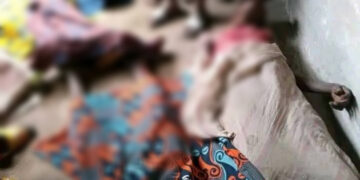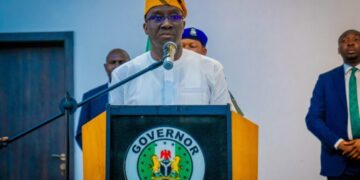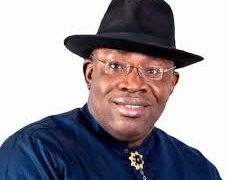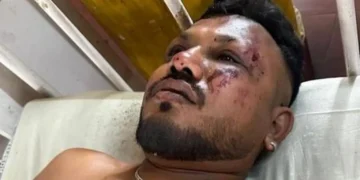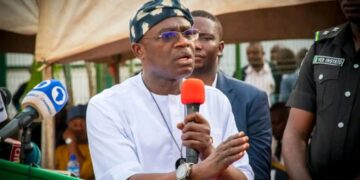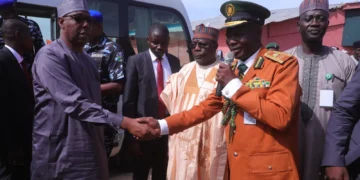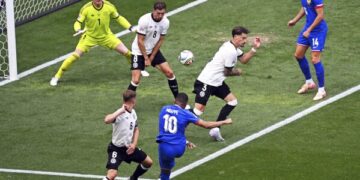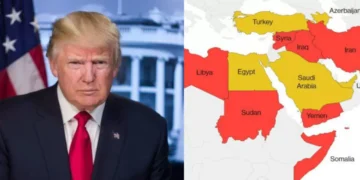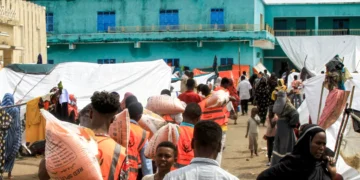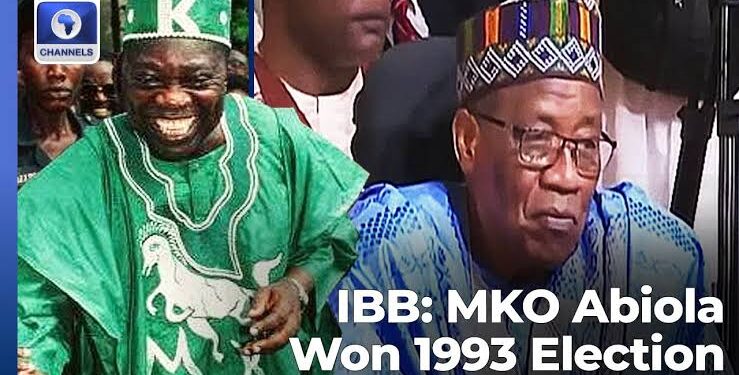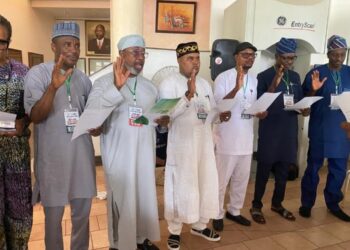June 12, 1993: Remembering M K O Abiola
By Yadnom Awu
Even if it be but for once that the elephant passes an earth road, it must leave its footprints on the soil – Ancient African Proverb.And how true this is!Some 32 years or so ago, something happened in this land – this country – that was to draw my personal attention to the truism of the above wise crack. It had to do with the historic, yes, it was truly historic – June 12, 1993 presidential election and how coverage of that election (as Government House correspondent, Edo state, under Chief John Odigie Evbuomewayonwan Oyegun as Governor) enabled me have personal contact with the late icon, Moshood Kashimavo Olawale Abiola, popularly called MKO Abiola. Remember that Abiola (whose initials (MKO) had been interpreted by ingenious Nigerians as money, kudi, owo) was the presidential flagbearer of the Social Democratic Party (SDP) under the national chairmanship of Chief Tony Anenih, the political chess master from Uromi, central highland of the Esan plateau. Abiola ran the field on the joint ticket with Ambassador Babagana Kingibe and had to contend with Alhaji Bashir Tofa of the National Republican Convention (NFC) led by Architect Tom Ikimi as National Chairman. Though both parties are now defunct – no thanks to the sweeping demolition of all democratic structures in the Sani Abacha coup of November 17, 1993. Abacha overthrew the Interim National Government (ING), led by Chief Ernest Shonekan of the defunct UACN who was installed by the self-styled evil genius, Gen. Ibrahim Badamosi Babangida, popularly called IBB.Back to MKO Abiola.I had never met Basorun Abiola until the March 21-23 1993 National Convention and Presidential primary election in Jos, Plateau State. In that primary, notable Nigerians, including Chief Ralph Obioha, Babagana Kingibe, Abiola and Abubakar Atiku vied for honour. In the long run, Abubakar Atiku, who was showing a lot of potency against Abiola, had to be persuaded to step down. Following Atiku’s stepdown, Abiola won the primary and was declared SDP presidential flagbearer.But something happened that was eventually to prove prophetic in a way. As MKO Abiola mounted the young white horse (the SDP had a rare white horse, the Unicorn, as its symbol), a storm erupted: By the time it eased, every canopy in the stadium had collapsed and fallen.Before then, however, a ‘small’ symbolic thing had actually happened. To make their cases before the thousands of delegates at the stadium, each aspirant had five (5) minutes to wrap up his campaign. Everyone was wondering how it would turn out for Abiola, an established stammer of unequalled disposition. Everyone also knew that when it comes to oratory and the gift of efficient language use, Kingibe had no match.However, as events turned out, while Abiola, an incurable stammer, spoke seamlessly for the period, Kingibe was the one who had to struggle with his delivery. Everyone was shocked. It was part of the great fun that the SDP convention had turned into, with delegates from across all of the four major wind directions strenuously marketing the Nigerian Project and the undying brotherhood underlying it.That was in March 1993.When the party (SDP) held its convention for the election of its national officers, something happened. Everyone thought the South-Eastern flank of Nigeria was to produce the National Chairman of the party and every analytical finger had pointed in the direction of Architect Ekong Etuk as the man the cap fits. As voting progressed, everyone thought it was a done deal. Basking in unjustified confidence (as events proved later) the Ekong Etuk camp, falsely believing that the prize was already in their kitty, left early when delegates from a few states – mainly from the geographic north – had yet to vote. That proved to be their undoing. Ever so dynamic, the Tony Anenih camp, seeing this tactical mistake on the part of the Ekong Etuk camp, capitalized on it, and although there are no harmonized view on the strategy it adopted, it (Anenih camp) rode over the other, and when the result was announced, a bewildered Eastern bloc rejected the result and cried foul. That was around 3am.Following this dispute over the result, Abiola – who had got intelligence of the development from his son, Kola – now had to call an emergency meeting of the party’s Eastern bloc and elders of the party at which he reportedly consented to refund thrice whatever the Ekong Etuk camp had expended on its campaign and made some other personal promises to him. Reluctantly, the bloc, in deference to the appeal of the elders and Abiola, conceded and it was resolved that everyone should let Anenih be. Even then, Anenih could not immediately do his post-inaugural/acceptance speech.The Ekong group had alleged vote buying in rejecting the result, and, in addition, had, just like a few other insiders, spoken of their doubt about Anenih’s ability to stand by the party, in the event of any crisis. This fear, though thought unfounded initially, eventually proved prophetic because, quite unlike what was expected, Anenih was reluctant to receive MKO Abiola in his GRA, Benin City, residence when he (Abiola) returned from exile in France.In opting to retain the status quo (with the Anenih chairmanship), Abiola had said that since he was finding it difficult to pick a running mate (Atiku Abubakar, Kingibe, Paschal Bafyau – then NLC president – were all linked to that aspiration), it would be utterly unwise to literally add salt to injury by allowing the Eastern bloc go to court to challenge the poll or defect to another party as it had threatened.Today, decades down the line, it is still debatable whether the decision to allow Anenih be was a wise one, given what transpired later.For now, as I said, MKO in my few personal contacts with him, left a deep positive impression in my mind.And this is how.Abiola, Areonakakanfo, was a people’s general and was well schooled, inspite of his tremendous personal wealth, in human relations, corporate engagement and humility. He was, inspite of being a stammerer, a credible communicator extraordinaire gifted in wits and wise cracks. He could speak for hours, lacing each statement with relevant proverbs. I remember him telling us, after a hectic campaign, that whatever quarrel the barber has with the vulture has nothing to do with its hair. Of course, I could fill a whole book with the proverbs he made with effortless ease in the course of the campaign. Particularly, I remember him tell us that even evil the genius cannot clap with only one hand. On another occasion he gave us this philosophical one: The tree that cannot bear your weight when you lean against it cannot kill you if it falls on you! Haba MKO!His humility was extraordinary as was his ability to resolve issues. At the launch of his campaign in Kaduna (Polo ground), there was no water or food to drink and eat, and it was rumoured that the funds he had made available for that purpose had developed wings and flown into some persons’ pockets. But Abiola, just before anyone began to grumble, had gone round the problem: an alternative was found and everyone had a round stomach, thereafter. He even had to freight in Shina Peters to entertain the galactic ensemble of Nigerians at the event. And what a great show it was!At the same occasion, everyone was expecting him to come forward with a long and perhaps, boring, speech, but not him. After Sule Lamido, the SDP National Secretary, had spoken, Abiola only appeared on stage, and, in a gesture vowing faith and loyalty to the National Project and the national flag, bowed: Everyone clapped. He had demonstrated what a million words won’t convey with accuracy. Happily, everyone went home. During his campaign trips to the East, especially Enugu and Nsukka, Abiola, by his magic wand, was able to not only attract the flower of the political class and get their buy in, but even the idolized Zik of Africa, who spoke in Ibo, demonstrated faith in the new beginning when he said Nigerians, especially Ibos, should put behind then the unnecessary acrimony that existed between him and the great mystical philosopher and Premier of Western Region, Obafemi Awolowo, and do the needful. Yet, there was a little more to the outing. As in Nsukka, so in Abakiliki: the great Ibo warriors put up a rare dance in acceptance of their son, Abiola.In Ologbo, Edo State, something also happened. Abiola’s advance campaign team had arrived and were received by the local elders. But while the team was about to open up on why they were in town, the elders, after confirming that the visit was on account of Abiola, stopped them, shared communion with the drinks and kolanut brought and bade them (campaign team) to return home in God’s peace. They (elders) said they won’t waste their (campaign team’s) energy recalling a pleasant story they were already at home with: According to them, long before the campaign team’s arrival, they had already vowed – one and all – to vote Abiola, who had awarded several of their indigenes academic scholarship to even the doctorate degree level.At Irrua, the ancestral and spiritual home of the great Esan people of Edo state, the Abiola campaign train was 12 hours behind schedule. This was understandable given the outpouring of positive emotion at the places visited earlier: everyone waited to personally relate with him. Yet, when it arrived by 11pm, the throng, led by the Ogirrua (traditional ruler), were still waiting – keeping faith with the man the Ogirrua called his son. Abiola, stunned by this display of incredible fidelity, had to lie flat on the muddy water in the palace and vowed never to get up, unless so instructed by the royal father. Everyone was shocked, even the Ogirrua, who touched his (Abiola’s) back with his staff of office, in a symbolic gesture ordering him to stand. And, like almost everywhere else, the crowd was satisfied with seeing Abiola, who moved round, shaking hands with as many as he could. This display continued everywhere else we went to, even in Kano, his opponent’s state: the turnout there was something else – about 3,000 volunteer on outriders ushered us into the city, everyone of them evidently elated at developments and what hope it offers for Nigeria and her now united peoples.Aside all else, MKO was a man of the people.Upon his return to Nigeria from France, Abiola visited stakeholders in Benin and was treated to asked a luncheon at Government House. After the meal, MKO called top government officials and who prepared the meal; and after he was told, sent for her. In unsteady foot steps, the ageing caterer in Government House, apparently a low cadre staff, turned up, obviously nervous. The situation, at least, for her, became tense, and everyone who was discerning saw that she was fidgeting not just physically but also in spirit. However, to her eternal relief, Abiola only asked her personal questions relating to her family to which she responded that she was the bread winner of the family of herself, her aged husband and several children who were already out of secondary school but had no material means to pursue further education.In deep patience, Abiola heard her out and, as was typical of him, beckoned on Kola, his son, in gesture that only both of them could truly decipher. Moments later, Kola returned with two giant brown envelopes that evidently had been stuffed with cash. Abiola, in a most humble manner, handed over the two giant envelopes to the still shivering caterer who had not only been transfixed but alo dumbfounded. In place of words, her tears spoke volumes as Abiola advised her to hand over the money to her immediate family for the building of their personal house and for the education of their children in higher school, since, by his calculation, the contents of both (envelopes) could suffice for the intended purposes.Again, as on several other occasions, Abiola left everyone happy.One more thing, though.Abiola was a stickler for competency and was a great symbol of humility. All though the campaign – at least those I was privileged to attend, and these were indeed many – Abiola would gather journalists at the end of the day for a critical review of the activities of the day. At such gatherings, two things almost always happened: he would prepare and serve everyone tea – his favourite meal (it was no surprising that he was eventually undone with a laced cup of tea), and he would entertain critical questions, no matter how probing, without showing the slightest sign of weariness or unease. That was Abiola, our own dear Abiola.As for his die-hard attitude to quality and competency, it was self-evident in everything he did. For instance, he preferred Chris Mamman, a Deltan, as head of his media and communication team in place of the legion other competent media managers of Yoruba extraction. He extended the same virtue by hiring Sonny Okosun, a minority from the Esan village of Ibore in Edo State, as his choice musician for his campaigns. What more can they say? Abiola, by every honest calculation, may not have been a perfect being. None is, anyway. However, the values he shared and the prospect he represented for Nigeria, Africa’s giant, were never in doubt. Today, long after we lost him to butchery at the hands of those who should know better, our nation, now in the throes of multiple, avoidable crises, needs his type for the unity he symbolized and which we are now losing fast.For me, the loss is understandably deeper not only because I was, as a journalist covering the event, in the heat of all of what made June 12 feasible, but also because of a vow that his death has prevented Abiola from fulfilling to me. That is personal. But I have taken solace, at a very personal level, and immortalized him by naming Ngozi, the first daughter from my loin, after him. That is the least I can do for a man who gave Nigerians – from every divide – a sense of belonging and the hope, the great hope, it offered.To God be the glory.


